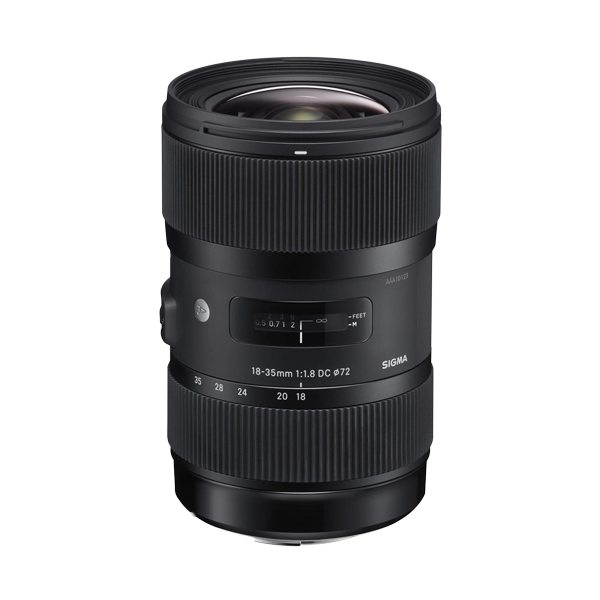Sigma Lens 18-35/1.8 DC HSM Nikon ART
Advanced flexibility and convenience expand photographic freedom.
Covering the angles of view offered by multiple large-aperture, fixed focal length lenses, this lens combines advanced flexibility with uncompromising performance.
Zoom lenses are extremely convenient, providing a wide range of angles of view with just a twist of the zoom ring. The downside, however, is that F2.8 has been the limit of zoom lens brightness, forcing photographers to select fixed focal length lenses for brighter f-numbers. Although fixed focal lenses have been superior to zoom lenses in terms of f-number brightness and overall performance, they offer only a fixed angle of view, requiring photographers to carry several with them and change lenses as necessary. The 18-35mm F1.8 DC HSM next-generation large-aperture standard zoom lens is the world’s first* to deliver F1.8 brightness throughout the zoom range. Its bright viewfinder makes it easy to confirm focus and compose perfect shots. As compared to a F2.8 lens in the same photographic conditions, it allows the photographer to use a shutter speed that is one stop faster, reducing the influence of camera shake. In addition, the shallower depth of field makes possible a beautiful bokeh effect in the background, expanding photographic creativity. From wide open to standard apertures, this lens is highly flexible, covering the angles of view offered by multiple large-aperture, fixed focal length lenses.
* For interchangeable lenses for digital SLR cameras (as of April 2013)
High-precision, rugged brass bayonet mount
The brass mount combines high precision with rugged construction. Its treated surfaces and enhanced strength contribute to the exceptional durability of the lens.
Inner Zoom
The lens incorporates an inner zoom. With their unchanging barrel length, these lenses also enhance balance and stability for the photographer. Furthermore, since the front of the lens does not rotate, polarizing filters can be used with extra convenience.
HSM (Hyper Sonic Motor)
The Hyper Sonic Motor (HSM) is an original SIGMA development that uses ultrasonic waves to drive the autofocus mechanism. Its extremely quiet operation helps avoid disturbing photographic subjects. High torque and speed assure rapid autofocus response. SIGMA uses two types of HSM: ring HSM and micro HSM. The Ring HSM configuration permits manual fine tuning of focus (manual override) by turning the focusing ring after autofocus is complete.
Rounded diaphragm
The polygonal shape of a conventional iris dia phragm causes out-of-focus light points to appear polygonal. A rounded diaphragm is designed to pro duce rounded out-of-focus light points when opened to near maximum aperture. This creates attractive bokeh effects in many situations, such as when pho tographing a subject against an out-of-focus surface of water from which light is being reflected.
Exclusive low-dispersion glass
The degree to which light is refracted by glass depends on the light’s wavelength. This fact causes different colors of light to focus at slightly different points. The result is chromatic aberration, the color fringing that is particularly noticeable in telephoto lenses. Most chromatic aberration can be removed by combining a high-refractivity convex lens element with a low-refractivity concave element. Yet residual chromatic aberration known as “secondary spectrum” may still remain. To minimize this secondary spectrum, which can be a serious issue with conventional lenses, SIGMA lenses feature up to three types of exclusive low-dispersion glass offering superior performance: ELD (Extraordinary Low Dispersion), SLD (Special Low Dispersion) and FLD (“F” Low Dispersion). In particular, FLD glass offers ultra-low dispersion in combination with high transmittance and the anomalous dispersion characteristics of fluorite. Meticulous deployment of these types of exclusive low-dispersion glass and optimization of power distribution gives SIGMA lenses superlative image rendition undiminished by residual chromatic aberration.
them over 3 interest free instalments
of R 5,663.33. Standard shipping terms
apply.
Find out how >>

Lens Construction - 17 elements in 12 groups
Angle of View - 76.5° - 44.2°
Number of Diaphragm Blades - 9 (Rounded diaphragm)
Minimum Aperture - F16
Minimum Focusing Distance - 28cm/11.0in.
Maximum Magnification Ratio - 1:4.3
Filter size - φ72mm
Dimensions (Diameter × Length)
SIGMA SA-Mount
φ78mm × 121mm / φ3.1in. × 4.8in.
*The length of a lens is measured from the filter surface to its mount.
Weight - SIGMA SA-Mount - 810g / 28.6oz.
Supplied Accessories
Case and Petal Type Lens Hood (LH780-06) included.
Corresponding AF Mounts / Barcode No.
SIGMA SA-Mount
00-85126-21056-4
Nikon F Mount
00-85126-21055-7















